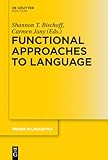Functional Approaches to Language / ed. by Carmen Jany, Shannon Bischoff.
Material type: TextSeries: Trends in Linguistics. Studies and Monographs [TiLSM] ; 248Publisher: Berlin ; Boston : De Gruyter Mouton, [2013]Copyright date: ©2013Description: 1 online resource (251 p.)Content type:
TextSeries: Trends in Linguistics. Studies and Monographs [TiLSM] ; 248Publisher: Berlin ; Boston : De Gruyter Mouton, [2013]Copyright date: ©2013Description: 1 online resource (251 p.)Content type: - 9783110285215
- 9783110285321
- 410.1/8 23
- P147 .F8617 2013
- P147 .F8617 2013
- online - DeGruyter
- Issued also in print.
| Item type | Current library | Call number | URL | Status | Notes | Barcode | |
|---|---|---|---|---|---|---|---|
 eBook
eBook
|
Biblioteca "Angelicum" Pont. Univ. S.Tommaso d'Aquino Nuvola online | online - DeGruyter (Browse shelf(Opens below)) | Online access | Not for loan (Accesso limitato) | Accesso per gli utenti autorizzati / Access for authorized users | (dgr)9783110285321 |
Frontmatter -- Contents -- Introduction -- On the Intellectual Roots of Functionalism in Linguistics -- Functional Explanation and its Uses -- Structure and Function: A Niche-Constructional Approach -- Toward a Thought-Based Linguistics -- Changing Language -- An Outline of Discourse Grammar -- Towards an Experimental Functional Linguistics: Production -- Acknowledgements -- References -- Index
restricted access online access with authorization star
http://purl.org/coar/access_right/c_16ec
Functionalism, as characterized by Allen, (2007:254) "holds that linguistic structures can only be understood and explained with reference to the semantic and communicative functions of language, whose primary function is to be a vehicle for social interaction among human beings." Since the 1970s, inspired by the work of Jespersen, Bolinger, Dik, Halliday, and Chafe, functionalism has been attached to a variety of movements and models making major contributions to linguistic theory and to various subfields within linguistics, such as syntax, discourse, language acquisition, cognitive linguistics, typology, and documentary linguistics. Further, functional approaches have had a major impact outside linguistics in fields such as psychology and education, both in terms of theory and application. The main goal of functionalist approaches is to clarify the dynamic relationship between form and function (Thompson 2003:53). Functionalist perspectives have gained more ground over the past decades with more linguists resorting to functional explanations to account for linguistic structure. The authors in this volume present the current state of functional approaches to linguistic inquiry expanding our knowledge of language and linguistics.
Issued also in print.
Mode of access: Internet via World Wide Web.
In English.
Description based on online resource; title from PDF title page (publisher's Web site, viewed 25. Jun 2024)


